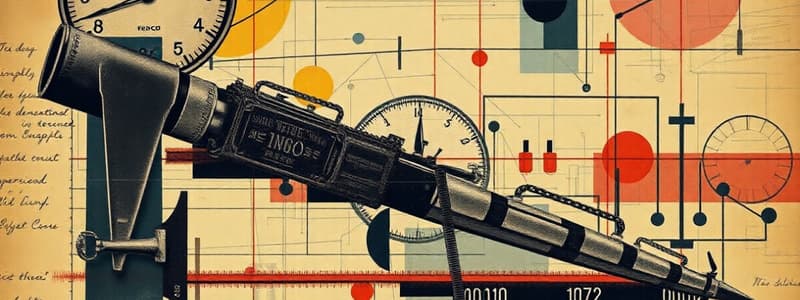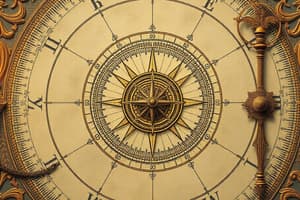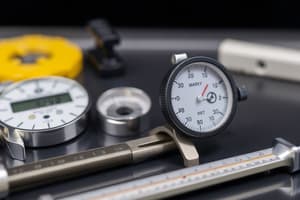Podcast
Questions and Answers
What is one of the primary purposes of metrology?
What is one of the primary purposes of metrology?
- To eliminate the need for quality supervision
- To manufacture products at a lower cost
- To ensure parts will fit and function (correct)
- To reduce production time
Which of the following quantities is NOT derived from length in dimensional metrology?
Which of the following quantities is NOT derived from length in dimensional metrology?
- Volume (correct)
- Roundness
- Flatness
- Width
Which profession would NOT typically require the use of metrology?
Which profession would NOT typically require the use of metrology?
- Manufacturing Engineers
- Marketing Specialists (correct)
- Meteorologists
- Quality Control Engineers
What historical development was essential for the Industrial Revolution?
What historical development was essential for the Industrial Revolution?
What ancient device is associated with the measurement of time?
What ancient device is associated with the measurement of time?
Who is credited with producing guns with interchangeable parts in 1801?
Who is credited with producing guns with interchangeable parts in 1801?
What was one consequence of the transition to mass production during the Industrial Revolution?
What was one consequence of the transition to mass production during the Industrial Revolution?
Which of the following best describes surface roughness?
Which of the following best describes surface roughness?
What is a primary focus of Metrology?
What is a primary focus of Metrology?
Which of the following is NOT considered a fundamental quantity in Metrology?
Which of the following is NOT considered a fundamental quantity in Metrology?
Who practices Metrology?
Who practices Metrology?
Which of the following best describes Measurement?
Which of the following best describes Measurement?
Which system of measurement is associated with Metrology?
Which system of measurement is associated with Metrology?
Which of the following is a derived quantity in Metrology?
Which of the following is a derived quantity in Metrology?
What does the term 'Dynamic Measurement' refer to?
What does the term 'Dynamic Measurement' refer to?
Which fundamental quantity corresponds to the unit 'candela'?
Which fundamental quantity corresponds to the unit 'candela'?
What is the percentage breakdown of grading for labs in this course?
What is the percentage breakdown of grading for labs in this course?
Which room is designated for lectures of MANU 3410 Metrology?
Which room is designated for lectures of MANU 3410 Metrology?
Which of the following topics is covered during the first week of the course?
Which of the following topics is covered during the first week of the course?
Who is the lab instructor for MANU 3410 Metrology?
Who is the lab instructor for MANU 3410 Metrology?
What is the scheduled time for laboratory sessions?
What is the scheduled time for laboratory sessions?
What type of equipment must be worn in the machine shop?
What type of equipment must be worn in the machine shop?
Which of the following topics is NOT part of the course outline?
Which of the following topics is NOT part of the course outline?
When does the midterm exam take place?
When does the midterm exam take place?
What is the office location for the course instructor?
What is the office location for the course instructor?
What is the contact email format recommended for students to use?
What is the contact email format recommended for students to use?
What was the presentation date of the Industrial Revolution's standard for the meter and kilogram?
What was the presentation date of the Industrial Revolution's standard for the meter and kilogram?
Which organization is responsible for the creation of the International System of Units (SI)?
Which organization is responsible for the creation of the International System of Units (SI)?
What does the MKS system in the SI Units stand for?
What does the MKS system in the SI Units stand for?
What type of measurement involves direct use of a calibrated measuring device?
What type of measurement involves direct use of a calibrated measuring device?
When was the International System of Units (SI) first drafted?
When was the International System of Units (SI) first drafted?
Which of the following measuring devices is not considered a calibrated device for direct measurement?
Which of the following measuring devices is not considered a calibrated device for direct measurement?
Which statement accurately reflects the nature of both types of measurement?
Which statement accurately reflects the nature of both types of measurement?
In what year was the SI base units redefined?
In what year was the SI base units redefined?
What is a 'Standard' in the context of calibration?
What is a 'Standard' in the context of calibration?
Which of the following questions is NOT essential when dealing with measurement errors?
Which of the following questions is NOT essential when dealing with measurement errors?
What does 'Precision' refer to in metrology?
What does 'Precision' refer to in metrology?
Which term is often incorrectly used interchangeably with accuracy outside of metrology?
Which term is often incorrectly used interchangeably with accuracy outside of metrology?
What is the primary concern when using gages?
What is the primary concern when using gages?
How does a measurement typically progress?
How does a measurement typically progress?
Which statement about measuring instruments is true?
Which statement about measuring instruments is true?
What is the main focus of metrology as defined by the International Bureau of Weights and Measures?
What is the main focus of metrology as defined by the International Bureau of Weights and Measures?
Flashcards
What is Metrology?
What is Metrology?
The science of measurement, focusing on comparing an unknown quantity to a known standard using a consistent unit system.
What is Meteorology?
What is Meteorology?
The science of predicting weather patterns.
Who is a Metrologist?
Who is a Metrologist?
A person who practices Metrology, specializing in measurement science.
What are the fundamental quantities in Metrology?
What are the fundamental quantities in Metrology?
Signup and view all the flashcards
What are derived quantities in Metrology?
What are derived quantities in Metrology?
Signup and view all the flashcards
What is the core focus of Metrology?
What is the core focus of Metrology?
Signup and view all the flashcards
What is a system of units?
What is a system of units?
Signup and view all the flashcards
What are the characteristics of measuring instruments?
What are the characteristics of measuring instruments?
Signup and view all the flashcards
Metrology
Metrology
Signup and view all the flashcards
Measurement Error
Measurement Error
Signup and view all the flashcards
Gage
Gage
Signup and view all the flashcards
Gage Blocks
Gage Blocks
Signup and view all the flashcards
Repeatability
Repeatability
Signup and view all the flashcards
Accuracy
Accuracy
Signup and view all the flashcards
Sensitivity
Sensitivity
Signup and view all the flashcards
Stability
Stability
Signup and view all the flashcards
Geometric Dimensioning and Tolerancing (GD&T)
Geometric Dimensioning and Tolerancing (GD&T)
Signup and view all the flashcards
Comparator
Comparator
Signup and view all the flashcards
What is the purpose of metrology?
What is the purpose of metrology?
Signup and view all the flashcards
Why is metrology important for inspection and quality control?
Why is metrology important for inspection and quality control?
Signup and view all the flashcards
What is the Egyptian Royal Cubit?
What is the Egyptian Royal Cubit?
Signup and view all the flashcards
What is the Egyptian Jeweler's Balance?
What is the Egyptian Jeweler's Balance?
Signup and view all the flashcards
What is a Greek Sun Dial?
What is a Greek Sun Dial?
Signup and view all the flashcards
What is the Industrial Revolution?
What is the Industrial Revolution?
Signup and view all the flashcards
What are interchangeable parts?
What are interchangeable parts?
Signup and view all the flashcards
What was Eli Whitney's contribution to the development of interchangeable parts?
What was Eli Whitney's contribution to the development of interchangeable parts?
Signup and view all the flashcards
The Industrial Revolution and the Metric System
The Industrial Revolution and the Metric System
Signup and view all the flashcards
What is the SI system?
What is the SI system?
Signup and view all the flashcards
The 2019 SI Redefinition
The 2019 SI Redefinition
Signup and view all the flashcards
What is Direct Measurement?
What is Direct Measurement?
Signup and view all the flashcards
What is Comparison Measurement?
What is Comparison Measurement?
Signup and view all the flashcards
How are Direct and Comparison Measurement Connected?
How are Direct and Comparison Measurement Connected?
Signup and view all the flashcards
Characteristics of Measuring Instruments
Characteristics of Measuring Instruments
Signup and view all the flashcards
What is a Standard in Metrology?
What is a Standard in Metrology?
Signup and view all the flashcards
What's the core idea behind the 'Fundamentals of Measurement'?
What's the core idea behind the 'Fundamentals of Measurement'?
Signup and view all the flashcards
What's the difference between Precision and Accuracy?
What's the difference between Precision and Accuracy?
Signup and view all the flashcards
How does a measurement take place?
How does a measurement take place?
Signup and view all the flashcards
What's the difference between a measurement instrument and a gage?
What's the difference between a measurement instrument and a gage?
Signup and view all the flashcards
Why is Metrology important in practical applications?
Why is Metrology important in practical applications?
Signup and view all the flashcards
What is the scientific method?
What is the scientific method?
Signup and view all the flashcards
Study Notes
MANU 3410 Metrology - Lecture 1 Overview
- Course overview, objectives, and schedule covered in Chapter 1 and 2
- Instructor: Lee McClelland, Office: SW09-205, Phone: 604-456-8032, Email: [email protected]
- Lab Instructor: Brian Ennis, Office: SW09-205, Phone: 604-451-6830, Email: [email protected]
- Course outline available at: https://www.bcit.ca/outlines/20251013092/
- Lectures: Thursdays 9:30 to 10:20 AM and 12:30 to 1:20 PM in SW09-107
- Labs: Tuesdays 8:30 to 12:20 PM in SW09-107 Metrology Lab Room
- Personal BCIT email (@my.bcit.ca) required
- Office hours available (see timetable, and by appointment) in SW09-205
Course Overview
- Marking breakdown: Labs 35%, Midterm 30%, Final 35%
- Week-by-week schedule detailing topics from Jan - Apr, including topics like Fundamentals of Measurement, Characteristics of Measuring Instruments, Dynamic Measurement, Measurement Systems, Gage Blocks, Midterm Exam, Spring Break, Fixed Gaging, surface roughness Coordinate Measuring Machines (CMMs), Final Exam.
Metrology Lab Topics
- Gage Blocks
- Taper Measurement
- Thread Measurement
- Optical Flats
- Air Gaging
- Electronic Gaging
- Layout Methods
- Surface Measurement
- Shadowgraph Measurement
- CMM
Introduction to Metrology
- Week 1 Outline: Introduction, History, Fundamentals of Measurement, Characteristics of Measuring Instruments, Dynamic Measurement, Measurement Systems.
- Metrology (simply stated): The science of measurement.
- Measurement is the comparison of an unknown quantity to a known standard, using a consistent system of units
- Metrology not equivalent to Meteorology; meteorology is the science of weather patterns
- What to measure: Seven fundamental quantities including Length, Mass, Time, Electric Current, Temperature, Light Intensity, and Amount of Matter, with more derived properties like Area, Volume, Velocity, Acceleration, Force, Pressure, Density.
- Dimensional Metrology/Mensuration: The study of length and related quantities such as width, depth, diameter, angle, straightness, flatness, roundness, and surface roughness.
- What is the purpose of Metrology?
- Express design intent, plan for future manufacturing and assembly, ensure parts fit.
- Inspection and Quality Control: Ensure parts meet specifications.
- If points 1. and 2. are correct, component fit and function are guaranteed.
- Brainstorming activity: Who needs to use Metrology? Engineers, repair/maintenance staff, CNC programmers, fixture designers, quality control engineers, inspectors, managers, machine setup personnel, tool and gage makers, scientists and researchers, meteorologists.
- Some history of standardization: Trade, fabrication, navigation, and science all required standardization. Examples like Egyptian Jeweler's Balance (2000 BC), Egyptian Royal Cubit (3000 BC), and Greek Sun Dial (200 BC) are mentioned.
- The Industrial Revolution (1760s to 1840s) marked the transition from craftsman-based production to mass production, leading to the need for interchangeable parts.
- Key figures like Eli Whitney (Interchangeable parts) and the development of machines like the milling machine (Simeon North).
- Also inclusion of Bicycle (1897) and Ford assembly line (1908-1925) manufacturing development
- The Platinum standard for the meter and kilogram was created in 1799 in France
Two Types of Measurement
- Direct Measurement: Using a calibrated device to measure dimensions (e.g., scales, digital calipers, height gauges).
- Comparison Measurement: Comparing an unknown dimension to a known standard.
- Importance of Standards: Standards are man-made lengths that all other lengths are compared to.
- Calibration involves measurement comparison, ensuring devices provide accurate reading
Fundamentals of Measurement
- Measurement is imperfect; errors are inherent
- Important to pinpoint error location, magnitude, source, impact and solutions.
- Two important metrology concepts concerning errors are;
- Precision: Degree of fineness
- Accuracy: Conformity to an accepted standard.
- There are subtle differences in use terminology outside the metrology lab
- Note: 'Measure', 'inspect', and 'gage' can often be used interchangeably.
- Gages are more often used for inspection/verification
2019 SI Base Unit Redefinition
- Metre (m): Defined in terms of speed of light
- Second (s): Defined in terms of cesium frequency.
Additional details:
- Specific lecture times and instructors
- Specific lab room locations and schedules
Studying That Suits You
Use AI to generate personalized quizzes and flashcards to suit your learning preferences.




